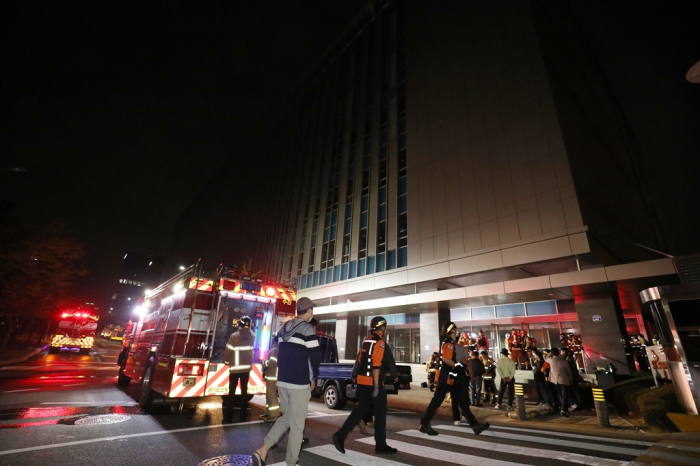Tech, Media & Telecom
Kakao’s power outage casts doubts over growth strategies
The Korean tech giant is aggressively expanding biz through M&As, but has not been focusing enough on integration -- sources
By Oct 17, 2022 (Gmt+09:00)
4
Min read
Most Read
LG Chem to sell water filter business to Glenwood PE for $692 million


Kyobo Life poised to buy Japan’s SBI Group-owned savings bank


KT&G eyes overseas M&A after rejecting activist fund's offer


StockX in merger talks with Naver’s online reseller Kream


Mirae Asset to be named Korea Post’s core real estate fund operator



South Korea’s mobile platform giant Kakao Corp. is facing increasing concern over its growth strategies centered on business expansions through acquisitions as a fire at a data center over the weekend disrupted its services across the board, including its flagship messaging app KakaoTalk.
Most of the services have been restored as of Monday as the data center at SK C&C in Pangyo, the so-called Silicon Valley of South Korea, was restored by 95%, according to Kakao officials. The data center was hit by a blast on Oct. 15.
The outage was the worst disaster for Kakao since 2010 when KakaoTalk was launched, industry sources said. The household-name chat application was disrupted for about 10 hours, affecting linked services such as taxi hailing, navigation, mobile games and all the sectors Kakao is now working in through its business expansion.
Kakao has been rapidly growing with an operating profit rise of 37.7% on average in the last five years with a sales increase of 32.8%, but is not seen to be substantial enough to warrant such growth.
LACK OF POST-MERGER INTEGRATION
Kakao has been expanding its businesses through acquisitions but without proper post-merger integration (PMI) among organizations, industry sources said.
The group had 134 affiliates as of end-June, more than eightfold the 16 in 2013. It has added 13.5 affiliates a year on average. Kakao Entertainment Corp. has some 30 affiliates through a slew of takeovers since 2016 when it acquired Loen Entertainment. Kakao Pay Corp. is also expanding through acquisitions of insurance startups and securities firms. Kakao Games Corp. has bought or invested in 11 companies.
The group has been giving affiliates as much autonomy as possible but has been negligent in the PMI, industry sources said.
“The headquarters does not involve itself in decisions made by affiliates,” said one of the sources. “It helps affiliates push ahead with the business quickly, but it is possible for affiliates to go ahead even when at odds with the company.”
Kakao Mobility Corp., the country’s top taxi-hailing app operator, was known to have sought to raise fees last year without discussions with Kakao.
An executive who recently joined the group was surprised when he saw affiliates easily making their own decisions on mergers and acquisitions.
“It means they have enough autonomy, but on the other hand, it also means they are not under an integrated management.”
WEAK GRIP
Kakao founder Brian Kim does not have enough power to control the whole group, industry sources said. Kim stepped down from the tech behemoth’s board of directors in March, but he is still working on its global expansion.

The group, which has been emphasizing free management of affiliates, set up a control tower namely “Kakao Community Consensus Center” in 2017. But executives of affiliates reportedly often implemented their plans even when Kim opposed their proposals at central meetings.
Earlier this year, Kakao established another body – Kakao Community Alignment Center – to tighten its grip on affiliates, but the control stayed weak, industry sources said.
“They have issued so many stock options that its grip on affiliates became looser,” said an investment banking industry source, who has direct knowledge of the group’s corporate governance.
Key executives focus more on short-term issues such as stock prices rather than long-term growth, the source said.
ANOTHER DATA CENTER PLANNED IN 2020
Such management practices have kept the group from investing in necessary sectors, resulting in the nationwide crisis, industry sources said.
Kakao unveiled a plan to spend 400 billion won ($278 million) on its own data center in 2020, the 15th year of its foundation.
That compared with its local rival Naver Corp. which set up a data center in 2013, the fourth year of its foundation and is building another one with an expected investment of more than 1 trillion won. The existing data center helped Naver quickly recover its services although it was also hit by the fire at SK C&C, which also hosts a data center for the online giant.
Amazon.com, Google and other global major tech companies operate availability zones (AZ) where at least three data centers are connected to exchange and back up data in real time. Amazon, the world’s largest online shopping mall, has four AZs in Seoul and has linked them with data centers physically separated from each other in different places. Those data centers use separate power supplies.
Global major tech companies also repeatedly conduct drills assuming extreme situations wherein all their servers are paralyzed. Google goes through such drills twice a year, while Microsoft Corp. does so once. They maintain strict security with the exact location of the drills undisclosed due to potential terror attacks.
Write to Seung-Woo Lee, Sang-Eun Lee, Han-Gyeol Seon and Hyeon-Woo Oh at leeswoo@hankyung.com
Jongwoo Cheon edited this article.
More to Read
-
 EntertainmentKakao Entertainment sets up content ecosystem with M&As
EntertainmentKakao Entertainment sets up content ecosystem with M&AsApr 14, 2022 (Gmt+09:00)
3 Min read -
 Tech, Media & TelecomBillionaire Kakao chairman Brian Kim resigns
Tech, Media & TelecomBillionaire Kakao chairman Brian Kim resignsMar 14, 2022 (Gmt+09:00)
4 Min read
Comment 0
LOG IN


